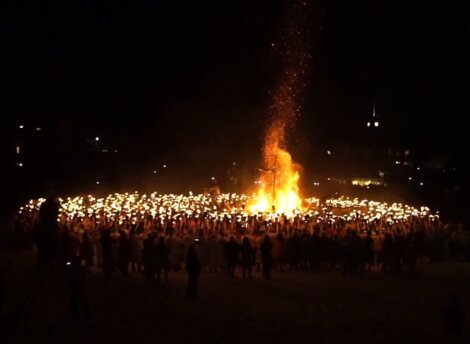Community / History in a wird: the origins of Up Helly Aa
IN TODAY’s instalment of the I Hear Dee project’s History in a Wird series, we explore the origins of the Up Helly Aa season of fire festivals.
Run by linguist Dr Viveka Velupillai and native Shaetlan speakers Roy Mullay, Julie Dennison and Andrew Blance, the I Hear Dee project aims to document and describe the contemporary use of the distinctive language variety.
In researching the history of the local tongue, the I Hear Dee team is regularly unearthing fascinating twists and turns, which Shetland News is happy to share to give it a wider audience.
It offers insights into the origin of the local language and how far travelled some of the words and phrases in regular use are.
More about Up Helly Aa is explained here in Shaetlan:
Hit’s da Up Helly Aa saison o fire festivals. Da festival’s røts gings back ti’ da end o da Napoleonic Waars, at endit in November 1815, whin young Shetland men wan haem. Dey wir seen winderfil things awa fae haem an decidit tae hae a spree trowe da bleak Yül in Lerwick.
Da onkerry cam tae be maed mair an mair inventive. Bi da 1840s da young men wir startit tae mak bombs wi dynamite. Dan dey startit hoidin demsels bi guizin an draggin barrels o tar dey wir set lowe til trowe Lerwick.
Dis maed a aafil maess an wis deingerous, so eventually da young men startit tae rig demsels up in costumes, caa demsels guizers an caa dir sprees Up Helly Aa.
Da first Up Helly Aa torch procession wis held athin 1881. In 1889 da first gelley wis brunt. In 1905 Haldane Burgess wrat da Up Helly Aa sang.
Da expression Up Helly Aa is aalder an comes fae da Scots Uphaliday, at markit da Feast o da Epiphany an da end o Christmas apø da 6 January. Da first attestation is fae 1478: vphalyday.
Become a member of Shetland News
Da Shetland Up Helly Aa fire festivals irna a ancient Viking festival, but reidder a blend o history an reinterpretation at’s maed a unique Shetland tradeetion at embodies da unique identity o Shetland.
Read mair aboot da origins o Up Helly Aa an its sang here:
Brian Smith (2021) Up Helly Aa has a most interesting history
Mark Smith (2022) Origins of the Up Helly Aa Song
Here is the English translation:
This is the Up Helly Aa season of fire festivals. The origin of the festivals started growing after the Napoleonic Wars, which ended in November 1815, when young Shetland men returned home. They had seen amazing things abroad and decided to liven up the winter bleak Lerwick.
The hullabaloo became more and more inventive. By the 1840s the young men had started to make bombs with dynamite. Then they started to disguise themselves and drag barrels of burning tar through Lerwick.
This was dirty and dangerous, so eventually the young men started to dress up in costumes, call themselves guizers and call their celebrations Up Helly Aa.
The first Up Helly Aa torch procession was held in 1881. In 1889 the first galley was burned. In 1905 Haldane Burgess wrote the Up Helly Aa song.
The expression Up Helly Aa is older and comes from Scots Uphaliday, which marked the Feast of the Epiphany and end of Christmas on 6 January. The first attestation is from 1478: vphalyday.
The Shetland Up Helly Aa fire festivals are not an ancient Viking festival, but rather a blend of history and reinterpretation which has created a unique Shetland tradition that embodies the unique identity of Shetland.
Read more about the origins of Up Helly Aa and its song here:
Brian Smith (2021) Up Helly Aa has a most interesting history
Mark Smith (2022) Origins of the Up Helly Aa Song
The work of I Hear Dee can be followed on various social media channels. The group also has a website at https://www.iheardee.com
Become a member of Shetland News
Shetland News is asking its many readers to consider paying for membership to get additional features and services: -
- Remove non-local ads;
- Bookmark posts to read later;
- Exclusive curated weekly newsletter;
- Hide membership messages;
- Comments open for discussion.
If you appreciate what we do and feel strongly about impartial local journalism, then please become a member of Shetland News by either making a single payment, or setting up a monthly, quarterly or yearly subscription.



































































